Starting your day with a consistent and grounding series of yoga poses can help you approach the day with a calm mind.
A sun salutation is a series of yogic movements that warm up the body without much strain on one’s muscles or joints. In addition to increasing your knowledge of different poses, these movements can reduce stress, improve cardio-respiratory fitness and increase flexibility.
These exercises can be performed at the beginning of a longer yoga session or used as stretching before a different workout. If you want to use this as a stand-alone exercise, increase the rate you perform the movements to increase your heart rate.
Every posture is linked with a deep inhale or exhale, and as you get more comfortable with the series, you will be able to repeat the sequence several times for the full physical and mental effect. When performing the movements, try to focus on coordinating one breath with one pose.
Although there are countless variations of sun salutations, the one described below is provided by Jennifer Perry, owner of 359° Yoga in Wyandotte, Michigan. Cassie Padula, an instructor at 359° Yoga demonstrates the poses in the photos below.
Let’s get started!
1. Standing Mountain Pose — Tadasana or Samasthiti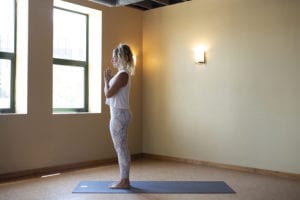
Stand with your feet hip-width apart. Press your palms together in prayer position. Rest your thumbs on your sternum (your spiritual heart) and take several breaths through the nose.
2. Upward Salute — Urdhva Hastasana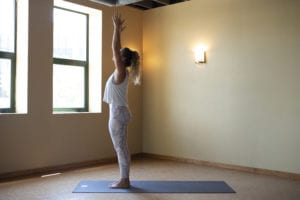
Inhale as you sweep your arms overhead. Softly arch your back and gaze toward the sky.
3. Standing Forward Fold — Uttanasana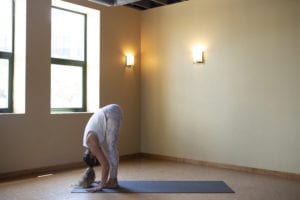
Exhale as you fold forward. Bending your knees if your fingertips do not touch the ground. Rest your hands beside your feet and draw your nose to your knees, crown of the head is heavy.
4. Half Standing Forward Fold — Ardha Uttanasana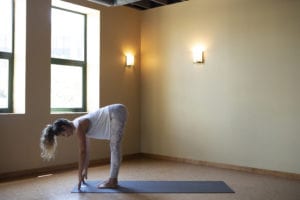
Inhale as you lift your torso halfway, lengthening your spine forward so your back is flat. Your torso should be parallel to the floor. Keep your fingertips on the floor, or bring them to your shins.
5. Four-Limbed Staff Pose — Chaturanga Dandasana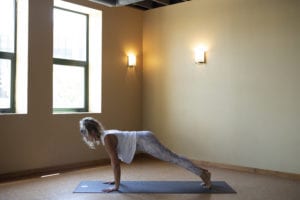
Exhale as you step or jump back into Plank Pose (High Push-Up Pose), with your hands under your shoulders and feet hip-distance apart. Continue exhaling as you lower your body toward the floor. Keep your elbows tucked in 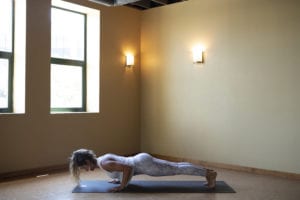 toward your sides. If needed, come to your knees for Half Chaturanga or all the way down to your belly for Cobra. Otherwise, keep your legs straight and reach back through your heels.
toward your sides. If needed, come to your knees for Half Chaturanga or all the way down to your belly for Cobra. Otherwise, keep your legs straight and reach back through your heels.
6. Upward-Facing Dog Pose — Urdhva Mukha Svanasana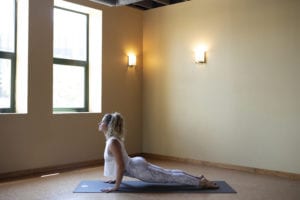
Inhale as you draw your chest forward and straighten your arms. Draw your shoulders back and lift your heart and eyes to the sky. Press through the tops of your feet, lifting your thighs off the floor and fully engaging your leg muscles. Keep your elbows tucked in toward your sides.
7. Downward-Facing Dog Pose — Adho Mukha Svanasana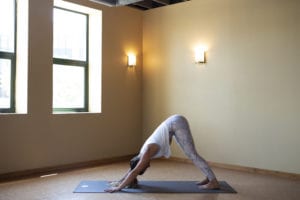
Exhale as you press your hips and tuck your toes, placing the soles of your feet on the floor. Your heels do not need to touch the ground. Ground down through your hands and the soles of your feet as you lengthen your spine. Gaze is toward the back of the mat or at your knees. Stay here for five breaths. On your last exhalation, bend your knees and look between your hands.
8. Half Standing Forward Fold — Ardha Uttanasana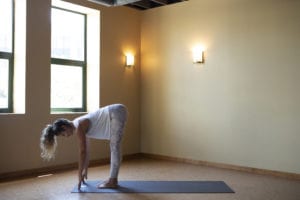
Inhale as you step or jump both feet between your hands. Lift your torso halfway, lengthening your spine forward so your back is flat. Your torso should be parallel to the floor. Keep your fingertips on the floor or bring them to your shins.
9. Standing Forward Fold — Uttanasana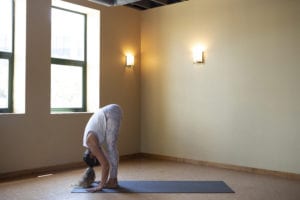
Exhale as you fold your torso over your thighs. Bend your knees if necessary. Rest your hands beside your feet and draw your nose to your knees, crown of the head heavy.
10. Upward Salute — Urdhva Hastasana
Inhale as you sweep your arms up and extend them up once again. Softly arch your back and gaze toward the sky.
11. Mountain Pose — Tadasana
Exhale as you come back into Mountain Pose. Bring your hands into prayer position. Rest your thumbs on your sternum. Repeat the sequence two or more times.
The routine can be repeated as many times as you feel is necessary. While also being a workout, it’s a great way to practice mindfulness and see if you can set your thoughts aside for a moment to be present in the workout.
If you liked this blog, check out:
- Yoga poses for pain relief
- 5 Ways to Improve Flexibility Through Yoga
- Yoga Classes in Michigan Everyone Can Afford
Main image photo credit: Getty Images








